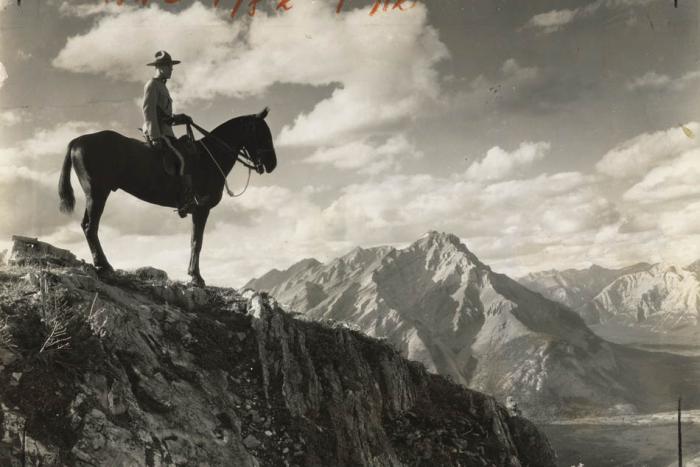In the snow-draped wilderness 32 kilometres southeast of High Prairie, four men huddled around a feeble campfire. Snow tumbled wetly upon their heads and the burning wood sizzled and crackled, sending wisps of smoke into the air. A wan moon had risen above the trees and though obscured by thick cloud, its faint light stole the night’s inky edge.
Erik surveyed the bloodied faces of the surviving passengers, Paul to his left and Larry to his right, both smoking silently. Scott lay on the ground next to him, the topcoat draped over him speckled with snow. Inside the plane, five passengers were dead and another critically injured. Erik was overcome with guilt and remorse.
Tell them. Tell them who you are.
His lips moved soundlessly, but he couldn’t bring himself to say it aloud. Blood still dripped from the open gash on his forehead, dark- ening the snow at his feet. Finally, Erik got it out, his voice thick with emotion. “I’m the pilot,” he said.
Scott had not stirred since being set down, but now asked, “How long will it take before they start looking for us?”
Erik glanced reflexively at his wrist, but saw only a deep gash the metal watch strap had sliced into his flesh. The watch itself was gone. He had no idea how long they had been on the ground, but he’d radi- oed his position just before he’d veered out of controlled airspace. Air traffic control would have been expecting him to contact them and when he didn’t, would have sounded the alarm.
Erik explained that the plane’s ELT would lead rescuers to them within a few hours. What he didn’t appreciate was how difficult the task of pinpointing the crash site would be that night.
Scott checked his watch. They’d been on the ground for two hours and he wondered how long they could last. Like all RCMP officers, Scott was trained in first aid. He’d noticed Erik’s laboured, shallow breaths and had taken this as a bad sign—probably a punctured lung and internal bleeding. He’d diagnosed his own condition as a flail chest: a life-threatening injury in which a segment of rib cage breaks in multiple locations, becomes separated from the chest wall and moves in opposition to it.
Larry, too, appeared to be suffering. He had refused to sit down and when he walked, his movements were slow and painfully precise, his arms outstretched to compensate for his blindness. Larry’s hands and face were cut and swollen and one of his fingers was bent at an odd angle, clearly broken or dislocated.
Paul, apart from a gash on his temple, seemed fine.
While the others had waded into the bush in search of wood, Scott had come up with a laundry list of things the men would need if they hoped to survive: a radio to contact rescuers, a first aid kit, flares, blankets, a hatchet. Now that he knew Erik was the pilot, Scott asked him about each item in turn.
Somberly, Erik shook his head. The radio and battery had been destroyed in the crash and the plane didn’t carry any of the other items.
“No survival gear?” Scott asked, incredulous.
Erik told him there was no legal requirement to carry any of it, and even if there were, it would take up too much space and add weight to Wapiti’s often fully loaded planes.
Scott couldn’t believe it. He routinely carried as much on his back when hiking or skiing in the backcountry. Without an axe, he knew the men would be hard pressed to gather enough wood to keep the fire going. Already, it was proving a challenge. Every fifteen to twenty minutes, the flame sputtered and the three ambulatory survivors had to leave the warmth of the fire in search of more wood.
“What about a flashlight?” Scott finally asked.
Erik surprised him by saying yes, remembering his penlight. “I have one in my flight bag.”
“Where would it be?” “Right next to my seat,” Erik told him. “I’ll go,” Paul offered. He knew exactly where the bag was. “If you find it,” Erik told him, “there are four chocolate chip cookies in that bag.”
*
Scott raised his head from the ground and watched Paul leave. Fog shrouded the treetops and a dense stand of forest surrounded them. Scott was no stranger to the wilderness. An only child, he’d spent much of his childhood and teenage years hunting and fishing in the bush around the Vancouver suburb of Delta. By the time he was twelve, he was snaring rabbits and raccoons. At fourteen, he was running his own trapline, selling the skins for profit and even making a few Daniel Boone–style hats from the pelts. Later, he’d moved on to hunting larger game.
He’d always been comfortable in the wild, and he’d never felt helpless in it until now. He squinted into the forest beyond the fire’s lickering glow, searching for a shadow of movement or the reflective flash of eyes through the trees. This was bear country. Wolf country.
“My gun,” he said, clutching the empty holster on his chest. Frantically, Scott began darting his eyes across the snow around him.
Erik assumed the worst. He’s going to kill me for crashing the plane.
He staggered back from the fire, his breath coming in rapid, painful gasps. In spite of the cold, hot sweat dampened the back of his neck. The thought of putting more distance between himself and the cop briefly crossed Erik’s mind, but his insides burned with pain and his hands hung mangled and grossly swollen at his sides. He knew he wasn’t going anywhere.
I deserve this, he thought, closing his eyes.
Scott was frantically trying to recall where he’d left his sidearm. Then he remembered. He’d placed it inside his briefcase and put the briefcase beneath his seat before takeoff. It had to be somewhere inside the plane. He glanced toward the wreck, but Paul was nowhere in sight. Though RCMP regulations required Scott to keep his firearm at his side at all times, there was nothing he could do about it now. He only hoped his prisoner wouldn’t find it.
*
Paul quickly closed the distance to the plane and crawled in through the cockpit window. The trapped passenger was still moaning and Paul could also hear a disturbing repetitive sound above him. Thud. Thud. Thud. He realized the passenger was slamming his left arm against the cabin wall. Paul froze. “Don’t worry,” he whispered to the wounded man, “we’re not leaving you. Rescue is coming soon.”
As if comforted by Paul’s words, the passenger stopped banging. Paul waited a moment and reached for Erik’s flight bag, sliding it carefully from around the man’s other arm. As quickly as he’d entered, Paul left the plane.
Setting the bag at his feet, he fumbled for Larry’s cigarettes. Lighting one, he dragged deeply until the nicotine calmed him. He looked around and spied a black briefcase half-buried in the snow. Paul pulled it out and shook it vigorously, but heard only the sound of shifting paper. Hanging on to the briefcase, he shouldered Erik’s flight bag and returned to the fire. When he arrived, he flipped the clasps of the briefcase and opened it. His eyes confirmed what his ears had already told him: it contained only papers. As Paul added them to the fire, Larry wondered briefly if they were his files that hours before had seemed like the most important documents in the world. Paul snapped the briefcase shut and offered it to Larry as a seat, but Larry shook his head. Then Paul turned his attention to the flight bag. The pen- light was not in it, but the cookies from Erik’s mother more than made up for that.
“Good thing you removed those handcuffs, huh?” Paul joked to Scott. Though his tone was light, it hadn’t escaped him that he prob- ably would have lost his hands—or worse—if he’d still been in cuffs. Nor could the others ignore their good fortune: they were alive while six passengers lay dead or dying inside the plane.
Paul pulled out Larry’s pack of cigarettes, offering him one and taking another for himself. Almost too brightly, Paul launched into a string of lewd barroom jokes.
“Did you hear the one about the captain who shipwrecked his boat in the middle of the ocean?”
An uneasy look passed between Larry and Scott and they glanced toward Erik, but Paul was already into his story. Larry laughed politely when Paul was done, but his mind was elsewhere. He could scarcely believe that only hours ago he’d been sitting in the Alberta Legislature during question period. Grant Notley had stood across the floor from him demanding compensation for Steven Truscott, a teenager who had been falsely convicted of murder. Grant’s passionate words were etched in Larry’s memory: “Does the government consider there is, if not a legal obligation, a moral obligation for restitution?”
He’d agreed with Grant. Larry believed in restitution—in giving people a second chance. We’re often too quick to judge, he thought. Truscott was innocent, but had spent ten years in prison. Larry had always favoured the underdog and as a member of a visible minority, understood what it was like to be wrongly judged. Perhaps that was why he’d listened so intently to Grant’s speech that morning.
Larry felt his throat constrict. Grant had taken the co-pilot’s seat—the seat Larry had given up. Now Grant was dead along with others from his close-knit northern constituency.
He looked to his left where Erik sat quietly. Much of his face was dark with blood and his head was bowed. Larry may have been half-blind, but his powers of perception hadn’t dimmed.
“I could tell he was hurting physically and emotionally,” Larry recalled. Removing his necktie, he handed it to Erik to wrap around his head. Then he asked the young pilot, “What happened?”
Erik didn’t know until that moment, but he’d needed someone to ask the question, had needed to talk about the stress he’d been under during the past weeks at Wapiti. So he told the survivors everything: the pressure cooker atmosphere at the company, how it pushed its pilots and the weather. Erik admitted that he hadn’t wanted to take the flight that night, hadn’t believed it was safe. But he didn’t feel he’d had a choice. He thought his job was on the line.
“Why hasn’t somebody done something?” Larry asked.
“Lots of pilots complained to the government but the company is bulletproof.”
“How?”
“The owner has friends in high places.”
Larry was taken aback. He was one of those friends. Quietly, he admitted to Erik who he was and that he’d supported the airline. He also told the pilot that another of Wapiti’s staunchest supporters, Grant Notley, leader of Alberta’s New Democratic Party, was inside the plane.
Erik dropped his head into his hands. A long silence descended on the men and the fire waned, sending a deepening chill into their bones.
“I think it’s important to agree on something,” Larry said finally, his voice deep with emotion. “If we are asked, we need to say that the others died instantly. They did not suffer.” Paul kicked at the flight bag lying at his feet, stooping to pull out maps and papers, which he tossed on the fire. Then he fished out a hardbound journal and a camera, which he waved in front of Erik.
“You want this?”
Erik didn’t answer. He looked past the camera at what Paul held in his other hand: his pilot’s logbook. Paul slipped the camera into his pocket and handed the logbook to Erik. Slowly, he opened it and began flipping through the pages. In neat handwriting, on page after page, in column after column, were the hours and minutes—more than 1400 in all—of Erik’s hard-earned flying career: daytime hours, nighttime hours, hours on instruments and flying visually when the entire earth seemed to lie at his feet. Alongside them were dates and the names of the captains he’d served and the flights he had flown solo, and as captain, in command of his own aircraft, indeed, his own destiny.
Erik closed his fist tightly around a sheaf of papers and yanked, tearing them from the book. As the others silently looked on, he dropped them into the flames.






